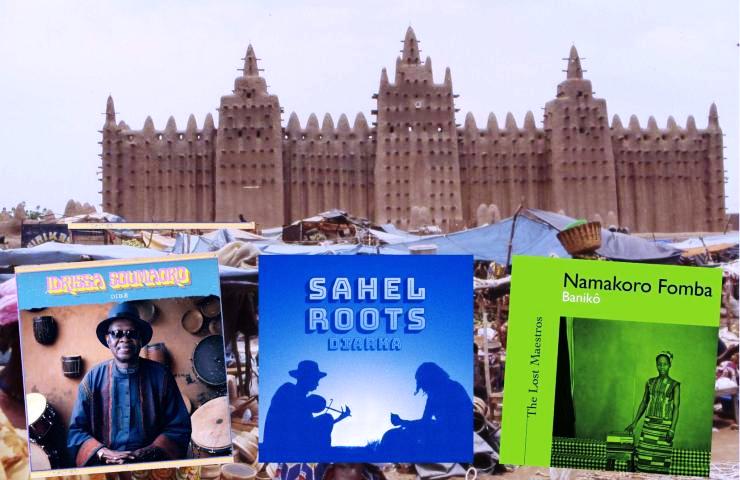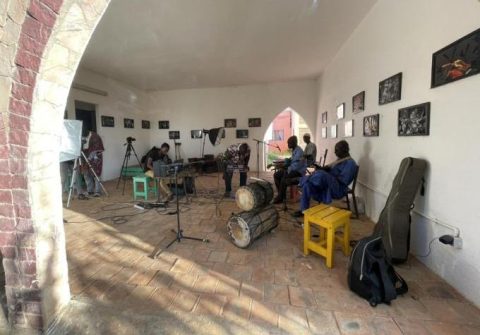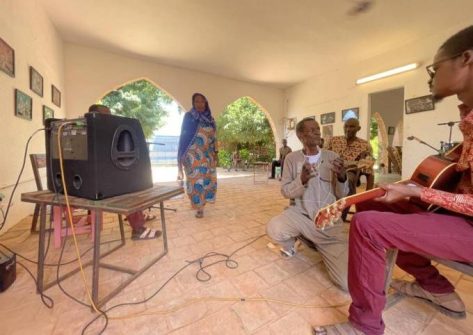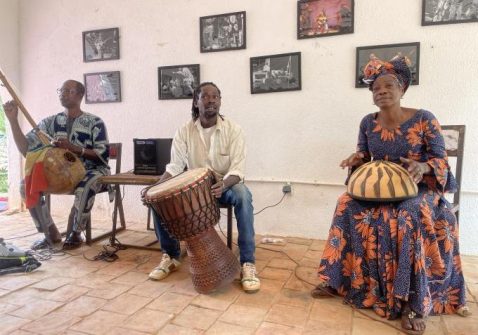Mali. The Mieruba label. ‘Music, our raw material’.

A collective runs a cultural centre and a record company in Ségou, an unstable area of Mali. To keep the art scene alive and because ‘music and the desire to live cannot be stopped’.
Now with eight titles, available digitally, The Lost Maestros is a series from the Malian label Mieruba intended to enhance the heritage of the golden, post-independence years of Malian music.
Mieruba also releases physical albums and new material, such as the recent Diré by veteran Idrissa Soumaoro.
Mieruba is part of the activities of the Mieruba Art Center, created in 2008 in Ségou, a stone’s throw from the Niger River. Over 300 kilometres north-east of the capital Bamako, Ségou, once the capital of the Bambara Empire, today the capital of the region of the same name, is located in an unsafe area due to the activities of jihadist groups. The centre is animated by a collective that replied to us via email.

“Music is like cotton or gold: a raw material that is extracted in Mali”. Photo: Mieruba Art Centre
Malian music continues to have strong visibility internationally through world music labels. Why then the initiative of a label?
One of the reasons is the need to relocate part of the music industry in the country. Music is like cotton or gold: a raw material that is extracted in Mali. This does not mean that it is not transformed and valorised by foreign labels driven by sincere respect for Malian culture, but the time has come to ‘decolonize’ world music. It needs to be done for the good of Malian music and there is immense work to be done for the rights of musicians. The vast majority do not perceive any rights for what they have created. Beyond the big names who give prestige to Malian culture in the world thanks to foreign labels, there are many extraordinary musicians who live in absolute precariousness. We have to start from here and it’s not easy because we have to consider all the works that have been in circulation in the world for more than fifty years.
This implies a general rethinking of world music, which at the moment is based on a ‘Western’ functioning that does not exactly reflect the reality of the local culture.
How did the cultural centre come about?
The project of the centre and the label were born together because they feed off each other: The Lost Maestros series is the foundation of all of Mieruba. Mangala Camara, who returned to Mali after twenty years of precarious employment in France, gave the first impulse – as well as Askia Modibo, returning from France where he had not found the space to express himself. He therefore felt the need for a local reality that could give voice and pay respect to artists who marked the golden era in which the fusion of tradition and modernity was experimented, and who have much to pass on to the new generation.

“The Lost Maestros series is the foundation of all of Mieruba”. Photo: Mieruba Art Centre
The situation of the region is not an easy one…
The initial idea was that of a meeting place between these great artists, the new generation and foreign artists. Before the war, many stars came to Mali (Bono, Damon Albarn, Robert Plant…) to ‘learn’ something. The hypothesis was to live on the fruit of these meetings, also on an economic level. Then the worsening of security conditions made the project unfeasible in the terms imagined. But despite the difficulties it was not possible to stop, due to the energy already spent and because Mieruba was becoming a point of reference, and the failure of the project would be a loss for the community of Ségou and for the Malian art scene. In a moment of general crisis, there is more reason than ever to spread music, and to do so from Ségou, a city at the crossroads between
north and south.
What projects are you running?
To have an international outlet we started a collaboration with a French vinyl pressing company and its label Deviation Records. With them, we published the first volume of the anthology The Lost Maestros and the first of the collection of songs by the legendary Super Biton de Ségou orchestra. We plan to publish the second volume of both of these. However, we have also started to distribute independently in digital and physical formats. In 2022, Mieruba received its first economic contribution from the AWA fund financed by the European Union and managed by the Fondation sur le Niger – considered an important reality for Ségou and all of Mali, which deals with culture and organizes the Festival sur le Niger, that every year fills the city with joy.

“Mieruba wants to become a reference first and foremost for local artists, to perform but also to get to know each other and rehearse”. Photo: Mieruba Art Centre
There are no longer many foreign tourists, but the festival is aimed primarily at the inhabitants and is an example of how, despite all the difficulties, music, and the desire to live, cannot be stopped.
Mieruba wants to become a reference first and foremost for local artists, to perform but also to get to know each other and rehearse.
We are completing a space dedicated to live performances and last September, as part of the Pacific Fusion #2 project, we had young musicians of varied origins in residence who, under the guidance of two members of Super Biton, worked to fuse different traditions in the name of peace and diversity.
What is happening in the music scene in the city?
There were once concerts in all the maquis (informal venues, ed.) of the city, but few survive, like the historic Mobaso. Painfully, some musicians moved to Bamako, but many are still here and okra – the music at weddings – remains a source of income. As throughout Mali, the new generation is also interested in rap, and small recording studios are widespread in the city; however, these energies are dispersed, and the necessary framework to achieve the quality they can easily aspire to, is often lacking. Despite everything, there is perhaps no better place in the world to continue the project and the dream of a cultural centre from which music can radiate. Music is Mali’s wealth and its weapon
for peace and prosperity.
Marcello Lorrai



